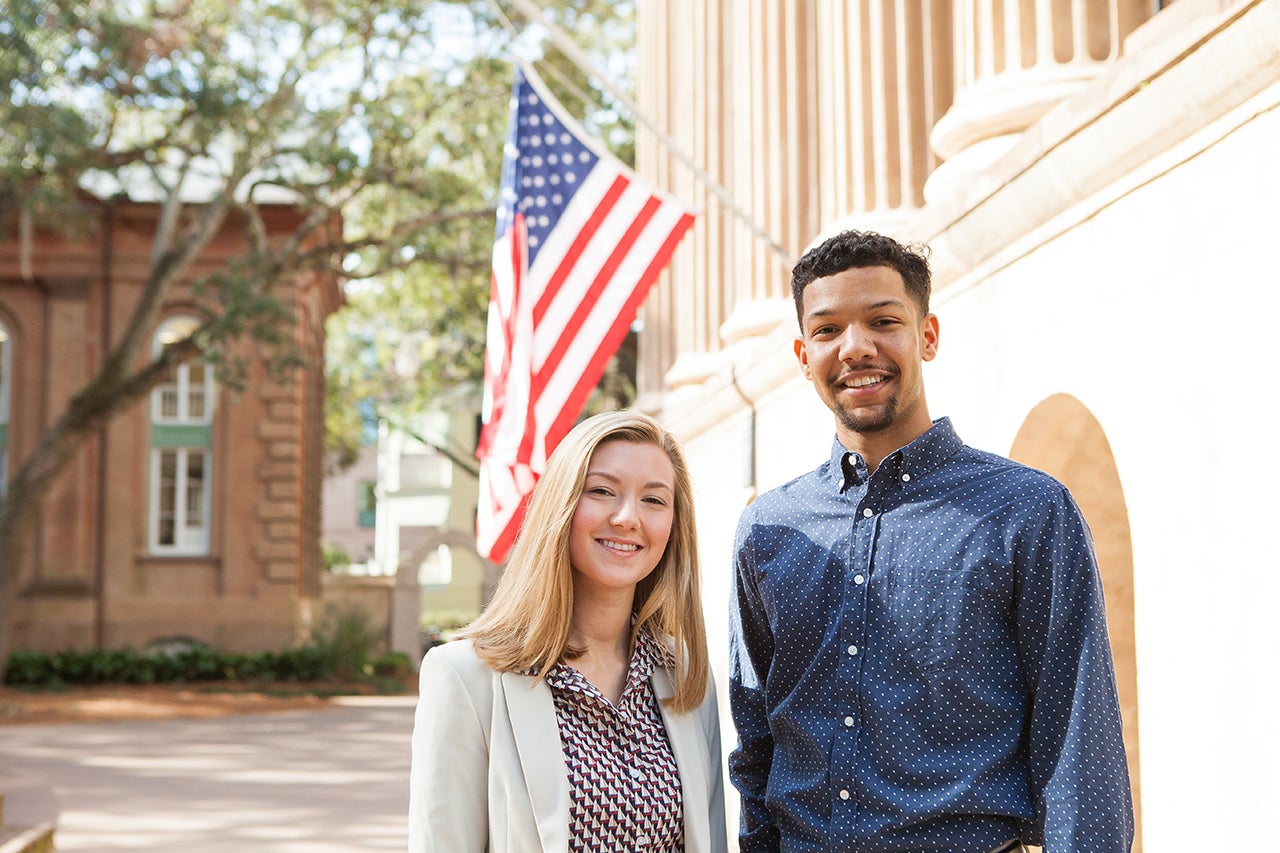During the 2016 Presidential election, College of Charleston students Deon McCray and Lauren Johnson noted how many Republicans defied tradition by rejecting the candidacy of now President Donald Trump as part of the so-called #NeverTrump movement. Taking advantage of a unique undergraduate research program that pairs students with faculty members, the pair set out to examine some of the factors behind the political phenomenon.
Now, their research has been published in the January 2018 edition of the journal Research & Politics. Co-authored by McCray and Johnson along with associate professor of political science Jordan Ragusa, the study examines the factors that explain why some Republicans refused to endorse Trump for President of the United States.
And the results, says McCray, were surprising.
“Religion and gender mattered the most,” says McCray. “Mormon GOP members and women in the GOP were most likely to oppose Trump’s candidacy. As far as establishment Republicans – they were the group that supported him the most.”
Of the 302 Republicans in the House and Senate, 49 lawmakers made unambiguous statements of opposition to Trump’s candidacy. Despite some initial reluctance by established Republicans to support then-candidate Trump, many, including House Speaker Paul Ryan, Senate Majority Leader Mitch McConnell and former presidential candidate Sen. Marco Rubio, all offered up endorsements after Trump clinched the Republican nomination.
“The #NeverTrump movement captured the attention of political scientists across the nation in the 2016 presidential election because it was such a departure from the norm,” says Johnson. “In most election years the party, whether it be the Democrats or Republicans, grants the leading candidate unwavering support. Seeing the inconsistency and resistance among Republican members of Congress regarding Donald Trump’s candidacy both in the primary and general elections, we wanted to find out what was driving each member’s support – or lack thereof.”
McCray and Johnson, both political science majors, partnered with Ragusa through the political science department’s American Politics Research Team. Founded in 2015 by Ragusa and professor and political science department chair Gibbs Knotts, the team’s mission is to conduct research on important topics in American politics, contribute to public discourse and help students develop research skills.
“Research of this type is beneficial for students for few reasons,” says Ragusa. “First, it greatly enhances students’ critical thinking skills, allowing them to explore questions on their own. I think this is especially important in today’s climate given what some call ‘post-truth politics.’ Second, it shows students that we can address controversial issues – like those surrounding Trump’s campaign – in a neutral manner. Our work doesn’t say whether Trump is good or bad, just what factors caused some of his co-partisans to support or oppose him. And third, students who conduct research – especially quantitative research – gain critical skills that employers looks for.”
For their study Johnson and McCray collected a range of data, including Republican lawmakers’ decisions to endorse or oppose Trump’s candidacy, demographic information and data on each member’s district. The results were not what they expected, says Ragusa, who noted that traditionally a politician’s decision to endorse or not endorse a candidate stems from their own pursuit of reelection.
“Our results indicate that electoral motivations do little to explain why members of the Republican Party joined the #NeverTrump movement,” says Ragusa. “We tend to think that lawmakers are single-minded in their pursuit of reelection. It turns out this isn’t the case vis-a-vis Trump’s campaign.”
And while reelection wasn’t the reason why some Republican lawmakers didn’t endorse Trump, politics, says McCray, does seem to be the driving factor in why so many longtime Republican Congressional members endorsed Trump.
“What’s interesting is how the establishment jumped on board because they wanted a Supreme Court justice and they wanted a Republican president,” McCray says.
Johnson and McCray, who are both seniors, are continuing their research this semester with a new paper examining whether Republican lawmakers are supporting or opposing legislation backed by Trump. Pursuing this type of research, says Johnson, is key to capturing the driving forces behind policies and laws in the United States.
“Analyzing data in any field helps us to better understand the world around us,” says Johnson. “In what some may describe as a rather tumultuous time in the realm of politics, it’s even more important to search for a greater understanding of the issues that are affecting our nation’s leaders, and in turn affecting the American public.”






